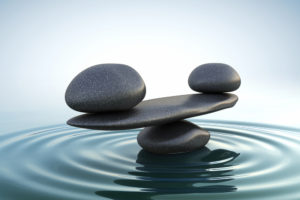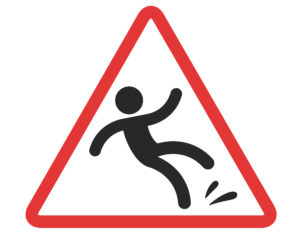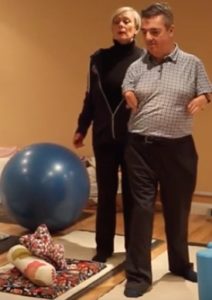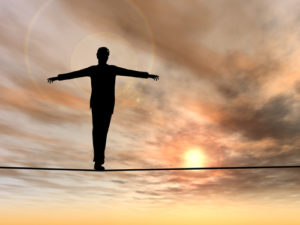Falls and Balance Awareness
The risk of having a fall increases for everyone as they grow older.
If you are unable to protect yourself in a fall it could result in significant injury, making your disability worse and affecting your independence and confidence.
Here we look at how a fall could affect you, what might cause you to fall and what you can do to reduce the risk of falling.

What are the risks of falling and how does it affect you?
The risk of falling is suffering serious injury which may then have knock-on effects, resulting in:
- Becoming less active due to reduced mobility
- Reduced independence as more support is needed to perform daily tasks
- Having to make changes to your home and garden
- Feeling less confident and more vulnerable, going out socially less
We know that beneficiaries have suffered serious injury by falling. For example, suffering head injuries, severe bruising, broken arms, legs etc. Some of you with short arms have described a 'whiplash effect' to the neck in the fall that has taken time to heal.
Any fall, even a minor one, can increase your disability for a while and make you more dependent on others.
Why do I fall?
There are many reasons why someone falls, for example loss of balance and being unsteady when you walk. However, it is usually a combination of several different issues that increases your risk of falling. These are some of the biggest causes:
- If you have had a fall in the past
- Walking issues and being unsteady on your feet i.e. balance problems
- Muscle weakness and foot problems
- Low Blood pressure
- Poor eyesight
- Poor control of passing urine, having to rush to the toilet
- Obstacles around the home

In addition:
- Medication – some common tablets that you can buy over the counter can cause dizziness or lower your blood pressure. If you take different tablets and more than one of these have these side-effects then the combination can greatly increase these kind of side-effects and increase your risk of falling.
- Generalised pain.
- Drinking too much alcohol – this can affect your balance and your ability to control your fall.
- Poor health e.g. arthritis, diabetes, Parkinson’s, stroke.
- Some heart conditions can cause you to black out and fall.
How do I prevent myself from falling?
Improve your balance and strength
Simple balance exercises
You can improve your balance by doing some simple exercises to strengthen the muscles in your legs, lower back and your core (the body of muscle around your tummy, lower back and hips). These can be done at home, in a group or individually with a physiotherapist or personal trainer.
See the NHS balance and strength exercises which can be done at home.
Try Pilates
Pilates develops muscle strength and flexibility throughout the body, with a particular focus on the core muscles.
Find out more about pilates and how beneficiaries have improved their strength.
Stay active
Doing regular physical activity such as walking, swimming or gardening will also help improve your overall strength and fitness. Tai chi is also good for strength and balance.
See our information on Getting Active to help find some activity to suit you.
Information for beneficiaries on how to improve strength and balance
See David’s story on how physiotherapy and specific exercises helped strengthen his core, improve his balance and gave him the confidence to start going out again.

Watch our physiotherapy video which talks about preventing falls with balance work, muscle strengthening and improving flexibility.
Make lifestyle changes
- Eat healthily to manage your weight and blood pressure, and keep up your strength which all help reduce the risk of falling. See information on food and nutrition
- Ensure your diet includes calcium rich foods such as milk, yoghurts etc. to help keep your bones strong. An additional supplement of Vitamin D of 400 iu daily is recommended for everyone in the UK.
- Keep hydrated to make sure you do not get lightheaded. 6-8 glasses of water per day is recommended.
- Look after your feet and choose the right shoes for you. See our webinar and information on foot health
- Use a walking stick or other walking aid.
- Get your eyesight checked.
How can I reduce the risk of falls at home?
- Immediately mop up spillages.
- Remove any trip hazards such as clutter, trailing wires and frayed carpet.
- Use non-slip mats and rugs.
- Make sure your home is well lit so you can see clearly.
- Organise your home so that climbing, stretching and bending are kept to a minimum, and to avoid bumping into things.
- Get help to do things that you're unable to do safely on your own.
What should I do if I'm worried about falling
- Learn to fall ‘safely’ – we know some of you have had to learn to do this since childhood. However, it may become more difficult as you get older and you lose strength and flexibility. A physiotherapist or a personal trainer can help.
- Learn how to get up after a fall – again some of you have been doing this since childhood but some of you may have lost the ability to do this and a physiotherapist or a personal trainer can help.
- Carry a mobile phone with you in case you need help.
Should I seek medical advice?
If you have had a fall you can go to see your GP for medical advice, particularly if you don’t know why you fell. They can help look to see if there are any underlying medical issues that contributed to the fall and help with how you are feeling. You can ask them to look to see if any tablets you take are causing you to feel dizzy or light headed - make sure you mention any you take from a chemist that they may not know. Very importantly they can also refer you to a Falls clinic where they will help you to look at everything mentioned in this fact here.
Personal alarms
Personal alarms allow you to call for help, for example, if you’re unwell or have a fall and can’t reach a telephone. Pressing a button on a pendant or wristband you wear all the time will alert a 24-hour response centre. The staff at the centre will then call out the best person to help you – a neighbour, relative or friend, carer or emergency services.
Telecare
A telecare system can automatically alert staff at a response centre if you need help, such as if you’ve fallen. For example, a bed or chair sensor can detect if you’ve got up but haven’t returned in a set time, and it will automatically send an alert to a carer or emergency service.
Overcoming a fear of falling
It's not unusual to feel anxious after a fall. However, if you keep feeling afraid of falling it may affect your confidence and stop you doing your everyday activities. This could include stopping going out and moving around less in your home.
If you are moving less you will lose body strength and balance, which in turn will make you less stable when walking and more likely to fall again.
There are things you can do to combat your fear of falling
- Keep active - this can be simple activities indoors, doing your hobbies, getting involved with your community and socialising
- Get outdoors for activities if possible
- Rebuild your confidence - set small achievable goals, try new activities or get involved with clubs and local groups to meet others
- Look after yourself - eat healthily, stay hydrated, get plenty of sleep and put yourself first
- Try relaxation exercises - this can help reduce tension and help you concentrate
- Talk to family and friends for support
For more details on the what you can do to reduce your fear falling visit the NHS website.
You are not alone...
Unfortunately if you have had a fall or are still experiencing falls, you are not alone and if you want to share your experience of falling with other beneficiaries, please let us know on 01480 474074 and we can arrange for this to be put on our website.

